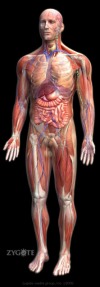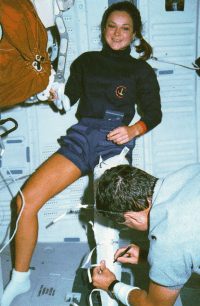The Effects of Microgravity on the Human Body

When an astronaut returns from an extended stay at the International Space Station, their physiology has changed. If you were to look at someone who just returned, the first thing you would notice would be their puffy face and their thin legs. However, there are also hidden changes that you cannot see that will greatly affect the astronauts. Their muscles have atrophied to some extent, their sense of balance has changed, and their heart has shrunk. There are even more effects that the microgravity environment of space has on the human body. Microgravity greatly reduces the astronauts’ ability to function in a gravitational environment. If long term space travel is to become a reality, then solutions to the problems microgravity causes need to be found.

When the human body first enters space and microgravity, the body senses an overabundance of fluid in the chest and head area. The body receives signals that tell it that the excess fluid needs to be eliminated. As a result, astronauts do not feel thirsty and drink far less. This creates an overall decrease in the body’s fluid level and has an effect on the heart. The heart no longer has to work so hard, and it shrinks (Human Body). Along with this change in fluid level, the legs and face are also affected. Fluid now accumulates in the face, where it normally would not due to gravity. This phenomenon has been dubbed “Puffy Face Syndrome” (Space Travel). Also, since fluid no longer collects in the legs because gravity is not there to pull the fluid down, a condition called “bird legs” occurs (Human Body).
Another major consequence of living in a microgravity environment is the deterioration of other body systems. Due to the lack of gravity in space, astronauts no longer need the full use of their skeletal and muscular systems (Human Body). When the muscles and bones are not being used, they begin to weaken. The bones lose critical minerals such as calcium, nitrogen, and phosphorus (Microgravity) and the muscles begin to become flabby and lose their tone and mass (Space Travel). Even the spine is affected in space. Astronauts can become as much as seven centimeters taller in space because the spine is no longer being compressed by gravity. As a result, astronauts often experience back pains and aches when they first enter space caused by a relaxing of the muscles and ligaments in the back (Space Travel).
Another major consequence of living in a microgravity environment is the deterioration of other body systems. Due to the lack of gravity in space, astronauts no longer need the full use of their skeletal and muscular systems (Human Body). When the muscles and bones are not being used, they begin to weaken. The bones lose critical minerals such as calcium, nitrogen, and phosphorus (Microgravity) and the muscles begin to become flabby and lose their tone and mass (Space Travel). Even the spine is affected in space. Astronauts can become as much as seven centimeters taller in space because the spine is no longer being compressed by gravity. As a result, astronauts often experience back pains and aches when they first enter space caused by a relaxing of the muscles and ligaments in the back (Space Travel).
